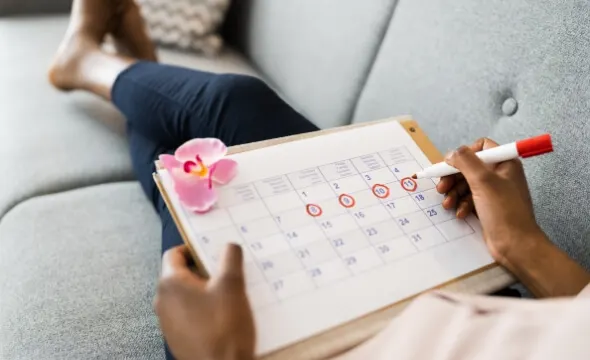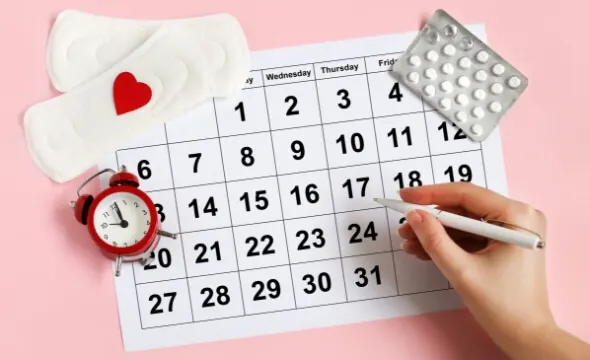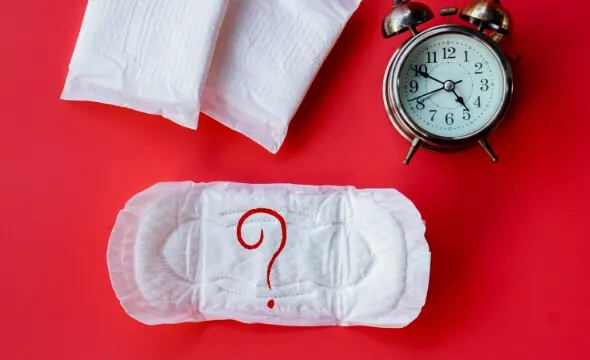Recognising Common Period Signs & Symptoms: Preparing for your First Menstrual Period

Getting your period for the very first time can be a thrilling affair. It is a time for new experiences and learning. You will greatly benefit from knowing what to expect when you get your period for the very first time, including the changes and developments it brings with it.
If you equip yourself with the knowledge to deal with the signs of coming periods, you will be fearless and better prepared when you get your first period. This article will answer your questions about the signs of periods and symptoms of menstruation, so make sure to read it completely.

First period signs can vary, which means they may not always be the same for you and, say, your friend.
As you approach your first menstrual period, your body will begin to show some symptoms. Some girls do not even get any symptoms of menstruation. But it is good to know about them anyway.


Signs you are getting your period
These are the most common signs that you might be getting your first period.
1. Development of Breast Buds
Your breasts typically develop over a period of four to five years. When you begin to feel your breasts growing, you can expect your first period in the next year or two. Or maybe even sooner.
2. Growth of Pubic Hair
As your breasts develop, you will also notice the growth of pubic hair i.e. hair around your vagina. In this case, your first period may follow in a few months or a year later. It is completely natural to have delayed hair growth. Your body knows best, so let it do its job. So, don't worry.
3. Vaginal Discharge
Vaginal discharge is the most common sign of getting your first period. You will notice a light yellowish or white fluid oozing out of your vagina from time to time. This discharge needs to be cleaned to maintain hygiene in the vaginal area. Here you may use Always panty liners to keep your panty clean and reduce discomfort, especially if you experience it often.
While there is no way to know when your first period will really arrive, you can keep a track of these period symptoms. These bodily signs are not mutually exclusive, which means you may notice all or some of them.
4. Mood Swings
Among the many signs of periods, a prevalent one is mood swings, which numerous individuals experience due to premenstrual syndrome (PMS). Factors such as hormonal fluctuations, especially changes in oestrogen and progesterone levels, can impact activity in your brain and lead to mood swings. You may experience anxiety, sadness or irritability. These are signs of the coming of periods. It is important to recognise the emotional shifts that come with menstruation so that you can cope with menstruation accordingly. Recognising these emotional shifts as symptoms of menstruation can assist in managing expectations and devising coping strategies. If you recognise these emotional shifts as symptoms of menstruation, then you can better cope with periods.
5. Acne Breakouts
If you experience acne breakouts, this is another common sign that your period is coming in a week. The hormonal changes associated with periods increase sebum production, leading to clogged pores and acne. These breakouts occur around the lower face, chin, and jawline. These align with signs of periods owing to the fluctuating hormonal levels. Understanding that these skin changes are mere symptoms of menstruation can help you plan your skincare routine and deal with hormonal breakouts head-on.
6. Bloating
Bloating is something that women with periods experience frequently. Your body tends to retain water thanks to hormonal changes. It can lead to feelings of fullness or swelling in the abdominal region. Bloating and other digestive changes is one of the common signs that your period is coming in a week. It is important that you recognise bloating as a natural symptom of menstruation. This will help you alter your dietary habits and choose clothing that gives you optimum comfort.
Awareness of these signs and symptoms can help individuals anticipate their menstrual cycle, manage discomfort, and implement routines to better cope with these temporary changes.
Things to Know to Prepare Before Your First Period
Getting your period for the first time can be daunting and exciting at the same time. It is important to prepare well for it so that the experience is easy. Hear are a few things to consider.
Light vs. Heavy Flow
An important aspect of periods is the variation in menstrual flow, which can range from light to heavy. If you have a light flow, you may only need a panty liner. However, a heavy flow may require more absorbent options such as thicker pads and tampons. It is crucial to have numerous menstrual products at hand depending on your flow levels, especially since the flow can change over the course of a period. Being prepared for both light and heavy days will make sure you are comfortable and protected all day long.
Colour Variations in Menstrual Blood
The colour of your menstrual blood can vary. It can be bright red or even dark brown, and at times, a shade of purple. There are variations that are often normal and depend on how long the blood has taken to leave your body. The fresher the blood, the redder it is likely to be, and the older blood, is more likely to be darker in colour. Understanding that these changes in colour are normal symptoms of menstruation will help you stay worry-free. Keep an eye on these colour variations as it can offer insight into what is happening with your cycle.
Recognising Symptoms and Signs
Before your first period, you are better off understanding the general symptoms of menstruation. Common symptoms include mood swings, cramps, and breast tenderness, which can be signs your period is coming in a week. Additionally. Other signs of your period coming include acne breakouts or a feeling of bloating. If you are aware of these symptoms, you can prepare mentally and physically for them. Make sure you have the necessary supplies and maintain comfort as your body undergoes these changes.
Having knowledge of these aspects before your first period will empower you to manage your menstrual health with confidence and ease. It’s always a good idea to ask questions and seek guidance from trusted adults or healthcare professionals to ensure you feel prepared for this new phase of life.


The First and Many to Come - What Causes Menstrual Period?

Don't fret if you don't get your period even after you complete your 15th birthday. It is totally normal to have a delayed onset.
Menstruation is a monthly cycle when blood and other impurities are discharged from your vagina for two to seven days. Typically, you can expect to get your first period between the ages of 10 and 15 years. But don't fret if you don't get your period even after you complete your 15th birthday. It is totally normal to have a delayed onset. Your body will respond appropriately when the time comes.
Entering menstruation also means that your body is now capable of reproducing. It is a natural process and all girls go through this phase. So, know that you are not alone on this, babe.
But while you excitedly wait for your periods to start, it is also good to know what causes them. Here’s why girls get periods and why it is exclusive only to them. Girls: 1, boys: 0, right?


Blame it on Oestrogen
When you enter your teenage years, there is a natural rise in the levels of oestrogen in the female body, the hormone responsible for reproduction. This rise causes the lining in your uterus to thicken, preparing you for eventual motherhood.
This lining is what supports a fertilized egg, which then develops into a baby. If there is no egg to hold, your body automatically starts to break down the lining and push it out of the uterus. This discharge of lining from your uterus is what you see when you get your period. This cycle typically repeats once every 21 to 35 days.
You should know that your menstrual cycle may not begin at the same time every month. It follows your biological clock and will take a few months to settle into a rhythm, especially when you first begin to get it.


Things to Know to Prepare Before Your First Period
Some guidance by the experts at Always to get you started with menstruation.
How to stay prepared for your first period?
- Clean underwear - Make it two!
- Sanitary pads – The ALWAYS Ultra Thin pads are great pads for teenagers. As the name suggests, these mini pads are ultra thin and come with a superior fit so you can perform your daily activities with ultimate ease and control. These mini pads have a Super Absorbent Core with InstantDry System that absorbs wetness in seconds and its Clean and Dry top cover keeps you dry and ensures long-lasting comfort.
Another great option of a pad for teenagers is the ALWAYS Cotton Soft Pads that provide cushiony soft comfort owing to its comfortable top sheet with Innovative soft design. Its Flexi Channels allow ease of movement and unique Flexi Wings help keep the pad in place so you can go about your day without any worry. - Clean wipes/napkins
Pro tip: It is always great to be prepared for your first period with a period kit, especially if it decides to arrive during a class. Stock it with wipes, a change of underwear and a pack of pads that suit teens.
How long will your first period last?
Your first period will last for a few days - going from up to two to seven days every month. Make sure that you have sufficient sanitary pads of supreme quality to manage your period, especially at night. The ALWAYS Night Dreamzzz Pads is best suited for night use. It is designed with Deep Channels that minimize the risk of leakage. Skip the worry of midnight leakage with a Wider Back that offers better coverage. It has Flexible Wings hold the pad in place through all your midnight twists and turns.
Symptoms when you get your period
The symptoms one experiences during their period range from one woman to another. Some experience a couple, some quite a few, while other, the blessed ones, get by with maybe just one symptom. Here's a list of symptoms that you may experience:- acne
- abdominal bloating
- soreness in your breasts
- back pain
- constipation
- diarrhea
- feeling more tired than usual (fatigue)
- feeling extra emotional or irritable
- food cravings, especially for sweets
- clear or white vaginal discharge
- Cramping
How to manage period cramps?
If you’ve just begun menstruating, the pain of cramps would be like your own personal hell hole! It may get some getting used to and initially, will understandably make you feel irritated due to the pain.Here are a few ways to help manage period cramps:
1. You can take over-the-counter medicines after consulting with a doctor. These can help you get immediate relief.2. Apply heat on your pelvic area, stomach or lower back in the form of a heating pad, heating wrap, or other heat packs.
3. Nothing feels better than a nice hot soak when you're on your periods.
Why is your first period delayed?
Your friends have already got their first period. And you are wondering when yours will arrive. Right?
Well, you don't need to worry as there is no perfect timing for the first period. You will get your first period when your body is ready. So just relax and focus on having your usual fun.
If the wait seems abnormally long, speak to your guardian or consult a doctor.
The thought of getting your first period doesn't have to bog you down. Life is just as wonderful even after you begin your period cycle. You can explore a wide range of Always feminine hygiene products like sanitary pads, tampons and panty liners to ease you through your periods. It is when you realise that it is a natural process of your body and prepares you to womanhood, you begin to appreciate it. And as usual, don't forget to have some fun, girl.
When to Seek Medical Advice for Menstrual Concerns
Menstrual cycles can have varied characteristics, and certain symptoms could call for medical attention. Understanding these concerns can help you identify when it is necessary to consult with a healthcare professional.
- Extremely Heavy Bleeding
Experiencing heavy bleeding is known as menorrhagia. This is a huge concern and one of the signs of periods that may necessitate a medical check-up. If you notice that you are needing to change your sanitary pads or tampons every hour, or if you are passing huge blood clots, then you need help. Perhaps hormonal imbalance or an underlying medical condition is to blame. Heavy bleeding can cause fatigue and iron-deficiency anaemia, so it is imperative to seek out medical advice in such cases.
- Periods That Last Too Long
Ordinarily, periods last three to seven days. So, if your periods last longer, it might be a cause for concern. Longer periods suggest fibroids, polycystic ovary syndrome (PCOS), or other health conditions that could affect the reproductive system. These signs of periods warrant reaching out to the doctor so that you can rule out complications and get effective treatment.
- Severe Pain That Disrupts Daily Activities
It is common to experience menstrual cramps during menstruation. However, if the pain is too severe, then it should not be ignored. Too much pain can disrupt daily activity and require medical intervention. It could signal serious conditions such as endometriosis or pelvic inflammatory disease. Staying abreast of the symptoms of menstruation can help you ease your pain and improve your quality of life.
Recognising the signs of periods can help you intervene early on and cater to your menstrual needs quickly. Furthermore, you can always approach a doctor to have other related questions answered.
The thought of getting your first period doesn't have to bog you down. Life is just as wonderful even after you begin your period cycle. You can explore a wide range of Always feminine hygiene products like sanitary pads, tampons and panty liners to ease you through your periods. It is when you realise that it is a natural process of your body and prepares you to womanhood, you begin to appreciate it. And as usual, don't forget to have some fun, girl.
Stay well prepared for your next period by tracking it on Always Period Calculator.
Disclaimer
Please note the date of last review or update on all articles. No content on this site, regardless of date, should ever be used as a substitute for direct medical advice, diagnosis or treatment from your doctor or other qualified clinician. Always is committed to ensuring that all of our products meet rigorous safety standards; Always pads prioritize safety, protection and comfort of its consumers.










